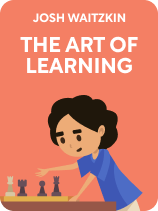

This article is an excerpt from the Shortform book guide to "The Art of Learning" by Josh Waitzkin. Shortform has the world's best summaries and analyses of books you should be reading.
Like this article? Sign up for a free trial here .
Do you practice mindfulness? How can mindfulness help you learn faster and more effectively?
Mindfulness is central to life and learning. Being mindful as you study or train can supercharge your learning by helping you to comprehend information faster, encode it deeper, and retain it for longer.
Here’s how mindful learning can help you master skills.
Presence Is Central to Life and Learning
Mindful learning means being intensely present as you learn. When you are deeply present, your attention is singularly focused on the task at hand, muting everything else.
(Shortform note: Waitzkin’s emphasis on presence evokes Eckhart Tolle’s perspective in The Power of Now, where Tolle argues that living intensely “in the here and now” is the only path to true fulfillment. While the two approach life differently—Waitzkin with an intense, single-minded focus on learning and growth and Tolle with an emphasis on healing, joy, and spiritual enlightenment—presence seems to uplift and aid both of them. This suggests that presence is a flexible tool for each individual to find and explore their own path toward fulfillment.)
In The Art of Learning, Josh Waitzkin gives two key reasons presence is important in life and competition:
#1: Presence Equips You to Navigate the Turbulence of Life
The world is unpredictable. Distractions and discomfort, Waitzkin says, often crop up without warning. If you want to be great at anything, you have to learn to navigate these obstacles.
Presence—a calm, focused mind—helps you handle tension, whether it’s physical, mental, or emotional. Though Waitzkin doesn’t explain specifically how, he suggests that presence is a key tool for focusing in distracting environments and overcoming emotional discomfort.
For example, in soccer, a dishonest competitor might illegally trip you. It’s reasonable to get angry at such behavior, but that doesn’t help you perform. Instead, use presence to recenter and get back on track.
(Shortform note: It’s helpful to think of Waitzkin’s notion of “presence” as mindfulness. Recent research supports his claim that presence is a key tool for emotional regulation. In short, practicing mindful presence develops your capacity for emotional nonreactivity—the capacity to experience your emotions without allowing them to dictate your behavior—by teaching you to find space between a stimulus and your reaction to it. This greater “cognitive flexibility” is useful in competition, as Waitzkin says, and throughout life.)
#2: Presence Is the Key to Competitive Success
Being present helps you remain focused on the growth process and regain perspective when you lose. For example, Waitzkin recounts an early loss in his chess career that knocked him off balance. By separating himself from the game and being present within his life, he was able to return refreshed and reinspired.
At a high level, a competitor’s level of presence greatly affects their success. The margins are so slim at the top that deeper presence is a significant advantage—namely, because it helps you reach a flow state, or “the zone.” If you can reach the zone under competitive pressure and your opponent can’t, Waitzkin says, you’re going to win.
Competitive success at any level requires that you regulate your emotions and show up fully. Both of these depend on presence, which helps you calm emotional turbulence as well as reach and maintain focus. Waitzkin says when he lost presence in competition, opponents took advantage of his turbulent emotions and lack of focus.
(Shortform note: Mindfulness plays a huge role in modern athletic training. Athletes like Derek Jeter, Kobe Bryant, and tennis champ Bianca Andreescu (who defeated Serena Williams) all cite presence as key to their success. Amy Saltzmann, a mindfulness coach who works with athletes, suggests that mindfulness training could even help amateur athletes to climb the ranks faster: Since mindfulness hasn’t fully permeated professional athletics, those who start practicing it while young can gain a mental and emotional advantage over their competition.)

———End of Preview———
Like what you just read? Read the rest of the world's best book summary and analysis of Josh Waitzkin's "The Art of Learning" at Shortform .
Here's what you'll find in our full The Art of Learning summary :
- Life advice from chess prodigy and tai chi World Champion Josh Waitzkin
- Detailed looks at the psychological and technical sides of skill-building
- How to build any skill from the bottom-up






